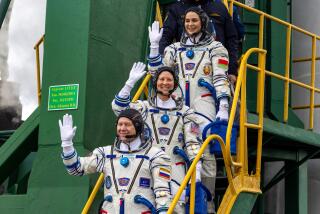Soviets Will End Freeze on Nuclear Arms Tests : Program Will Resume as Soon as U.S. Explodes First Device Next Year; Offer of Halt Renewed
- Share via
MOSCOW — The Soviet government announced Thursday that it will end its unilateral moratorium and resume nuclear testing as soon as the United States sets off its first nuclear explosion next year.
But if the United States were to stop testing, the Soviet Union would be willing to halt its tests “on any day of any month,” the Soviet government said in a statement distributed by Tass, the official news agency.
The Soviets proposed immediate negotiations with the United States on a total nuclear test ban and said that interim limits on the number and yield of tests would be acceptable as a start.
‘Their Business’
In Washington, a White House spokesman said that “whether or not the Soviets resume their nuclear testing is their business.”
The spokesman, Albert R. Brashear, said: “The U.S. position is clear and remains firm. Acceptance of the Soviet nuclear testing moratorium is not in the security interest of the U.S. or our friends and allies. Nuclear weapons will remain for the foreseeable future a key element in our deterrent. . . . Nuclear testing is required to ensure the safety, security, reliability, survivability and effectiveness of those nuclear weapons.”
The United States has not announced when its next nuclear test will take place, but the Washington Post has reported that it will be on Jan. 29. The U.S. Energy Department never announces tests more than two days in advance and then only if the test is to be a major blast that could cause tremors in towns near the Nevada test range.
The Soviet Union has refrained from nuclear tests since Aug. 6, 1985, the 40th anniversary of the atomic bombing of Hiroshima in the last days of World War II. The moratorium is scheduled to expire on Dec. 31.
During the moratorium period, the United States has conducted 24 nuclear weapons tests at the Nevada proving ground, the Soviet statement said Thursday. Four tests were not announced, it said.
“At a time when the United States stubbornly continues to fulfill its nuclear test program to develop new nuclear weapons and build them up, the Soviet Union cannot show unilateral restraint indefinitely,” the statement went on. “If this situation is continued, grave damage can be caused to the security of the Soviet Union and its allies.”
In the past, Soviet leader Mikhail S. Gorbachev has announced extensions of the moratorium on the nightly television news. But Thursday’s statement was read by an announcer.
The statement charged that the United States is seeking military superiority over the Soviet Union and the East Bloc by testing new types of nuclear weapons.
“Nuclear-pumped X-ray lasers under the Strategic Defense Initiative (“Star Wars”) program are being developed in the course of nuclear tests conducted by the United States,” it said. “Work is being done to produce weapons of a basically new type that would be capable of hitting targets in outer space and on Earth.”
Claims Sacrifices
The statement said the Soviet Union has made “serious sacrifices” in terms of its own security by refraining from testing.
“It is deeply regrettable that the current U.S. Administration has never given a positive response to the Soviet Union’s appeal to join its peace initiative,” the statement said, concluding: “Totally ignoring the demands of the world community . . . the United States is stubbornly going ahead with its nuclear weapon test programs.”
The Soviets brushed aside the U.S. argument that it would be difficult to verify a total test ban and said they would agree to on-site inspections and international verification procedures.
“The Soviet Union’s decision to terminate its moratorium after the first U.S. nuclear explosion next year is a forced measure, dictated exclusively by security interests,” the statement said.
According to analysts in Washington, the United States has conducted 780 tests since the dawn of the nuclear age in 1945, about 200 more than the Soviet Union.
“U.S. proposals on nuclear testing are practical and realistic,” said Brashear. “We have proposed to the Soviets an orderly plan for negotiations on nuclear testing.”
The White House official said it was first necessary to agree on effective verification of two existing treaties--the Threshold Test Ban Treaty and the Peaceful Nuclear Explosions Treaty--which have never been ratified by the United States.
President Reagan said before the October summit in Iceland that he would submit these treaties to the Senate “as the first order of business” when the 100th Congress convenes in January. But they would not go into effect until satisfactory verification procedures were worked out, Reagan said.
Asked if Reagan still intends to submit the treaties, Brashear replied that he does.
More to Read
Sign up for Essential California
The most important California stories and recommendations in your inbox every morning.
You may occasionally receive promotional content from the Los Angeles Times.










